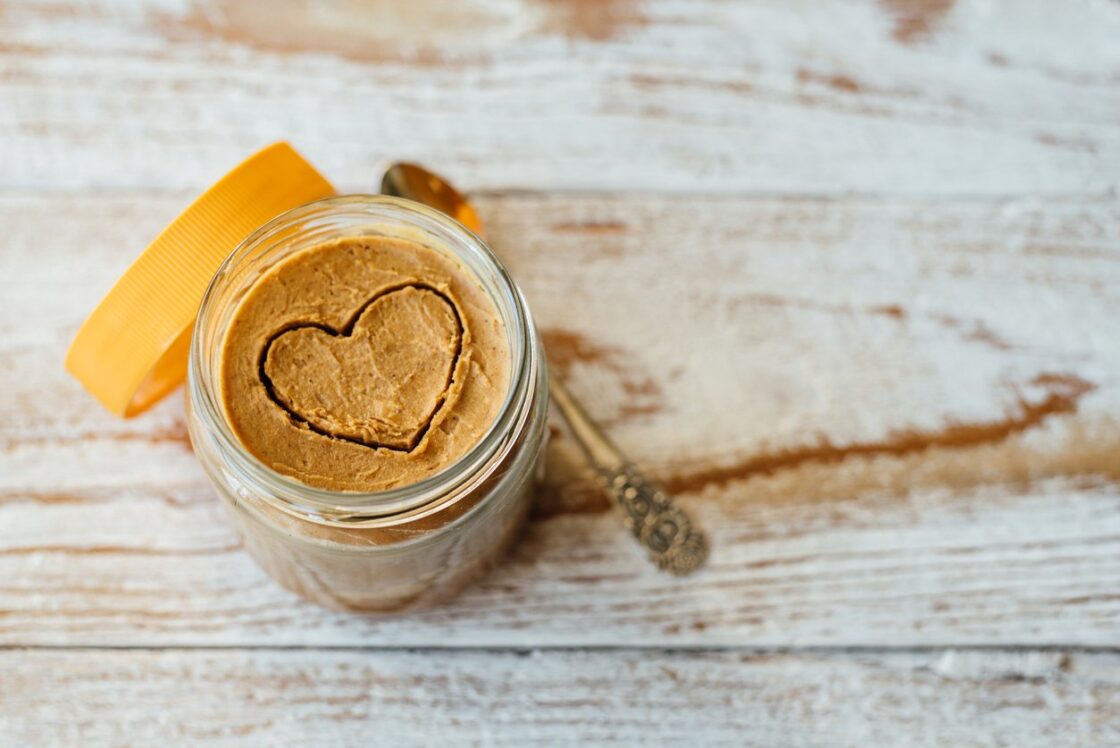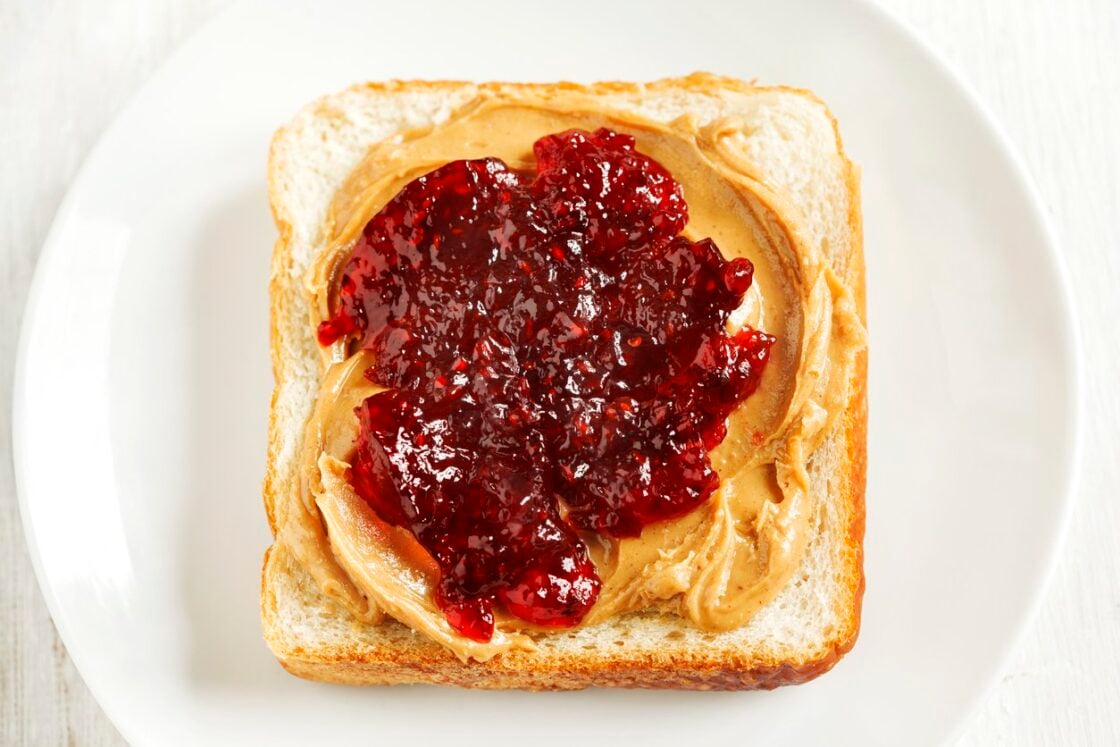Which is Healthier: Almond Butter or Peanut Butter?
What's on your sandwich?

Consider this a sandwich showdown: peanut butter versus almond butter. Both are delicious, filled with healthy fats and nutrients, and make for the perfect satisfying snack, but is one nut butter healthier than the other?
The Pros for Peanut Butter
Peanuts aren’t actually nuts; they’re the edible seeds of legumes filled with a variety of beneficial vitamins, minerals, protein, fiber, and healthy fats.
Roughly a quarter cup of peanuts or peanut butter contains 47 percent daily value of copper, a mineral essential for building tissues and collagen, producing energy, and maintaining blood volume.
Peanuts also contain manganese, vitamin B3 and B1, molybdenum, folate, biotin, phosphorus, vitamin E, protein, and antioxidants.
A 2016 review published in the Journal of Food Science Technology found that peanuts are packed with antioxidant compounds including resveratrol (the same compound that gives red wine its health claim to fame), phenolic acids, flavonoids and phytosterols that can help block the absorption of cholesterol from diet.
The concentration of these beneficial compounds actually increases once peanuts are roasted or boiled (a la peanut butter), according to the review.
Like other nuts and seeds, peanut butter is rich in healthy fats including monounsaturated fatty acids. A 2004 study found that a high monounsaturated fat diet (that includes peanuts and peanut butter) lowered participants total body cholesterol by 11 percent and LDL cholesterol by 14 percent, while maintain healthy HDL cholesterol.
Peanuts and peanut butter are protective against inflammation and certain cancers and are shown to provide long-term weight management, according to the 2016 review.

The Cons for Peanut Butter
Peanuts are one of the most common allergens. The number of children in the United States with a peanut allergy has more than tripled from 1997 to 2008, according to this 2010 study. Peanut allergies tend to be lifelong, however a 2013 study found that roughly 25 percent of children outgrow their peanut allergies.
The other bad news for peanut butter? Peanuts and peanut butter can be contaminated by aflatoxins, toxic mold carcinogenic to humans.
Peanuts aren’t the only food affected by aflatoxins, unfortunately. This mold has been found in almonds, pecans, pistachios, walnuts, corn, milk, grains, soybeans and spices, according to Dr. Andew Weil.
Aflatoxin is a potent carcinogen, are has been shown to cause liver cancer in laboratory animals, liver disease, autoimmune responses, digestive upset, and even in rare cases, death according to this 2005 review.
This isn’t cause to throw out every peanut product on your shelf, however. Sherry Coleman Collins, MS, RDN, LD, registered dietitian and consultant for National Peanut Board notes that peanuts grown and processed in the United States must adhere to rigorous growing standards, storage procedures, and testing for mold and aflatoxins.
“Technologically advanced production, processing and grading systems developed by the U.S. peanut industry and approved by the U.S. government work to control mold and reduce aflatoxin levels,” Collins notes.
Once peanuts are harvested, they are mechanically dried to remove moisture, making them safe for long-term storage. Peanuts are then stored in warehouses, not silos, specifically designed to inhibit moisture and growth of any mold.
Dr. Weil notes, “if you love peanuts, there’s no reason why you shouldn’t continue to eat them – and peanut butter – in moderation.”

The Pros for Almond Butter
Almond butter and almonds are subtly sweet and nutrient-packed. Just one-quarter cup of raw almonds or almond butter provides roughly 50 percent daily value of biotin, a B complex vitamin necessary for fat and sugar metabolism.
Almonds also contain an impressive amount of vitamin E (one of the best sources of this vitamin of any food), manganese, copper, vitamin B2, phosphorus, magnesium, molybdenum, and fiber.
The vitamin E in almonds and almond butter is associated with a plethora of health benefits including lowered rates of heart disease, certain types of cancer, cognitive decline, and Alzheimer’s disease.
Rich in antioxidants, almonds have been clinically shown to lower markers of inflammation and oxidative stress. A 2007 study published in the Journal of Nutrition analyzed oxidative stress and almond consumption of 60 male smokers. The researchers found that over a 4-week period, about 3 ounces of almonds per day reduced oxidative stress biomarkers by 23-34 percent.
Like other nuts, almonds are rich in heart-healthy fats associated with lowered cholesterol and weight maintenance. A 2014 study of 100 overweight women found that those who consumed almonds lost more weight than those who did not consume the nuts. The study also found that the women who ate almonds had improved waist circumference and lowered cholesterol and blood pressure.

The Cons for Almond Butter
Almonds and almond butter are high in phytic acid, an anti-nutrient that binds to certain minerals (including iron, zinc, and calcium) and prevents them from being absorbed, which can lead to deficiencies.
Soaking and sprouting raw nuts and seeds that contain phytic acid can neutralize the compound. These nuts include almonds, pecans, walnuts, pumpkin seeds, cashews, and macadamia nuts, among others.
Phytic acid can be removed by soaking nuts in salted water overnight and dehydrating or placing in a low oven (around 150 degrees Fahrenheit) for 12 to 24 hours.
Most almond butter found at the grocery store has not been properly soaked to remove phytic acid. If you consume a diet rich in a wide variety of plant foods or have no digestive issues around nuts and seeds, the phytic acid content shouldn’t prevent you from buying a jar, however.

Almond Butter Versus Peanut Butter
Both almond butter and peanut butter are rich in protein, healthy fats, and a wide variety of vitamins, minerals, antioxidant, and fiber.
Choosing which nut butter is best for you depend on personal taste preferences, flavor, and usage. Peanut butter is delicious with anything chocolate as well as Asian-inspired sauces and dishes, while almond butter is great in baking, smoothies, and raw treats.
Make your own nut butter at home, or look for a minimal processed store-bought version. Always purchase a jar of organic nut butter that contains minimal ingredients, meaning no extra sugar, refined oils, or mystery ingredients added in.
The jury is still out on whether almond butter or peanut butter is healthier. It seems the clear answer is eating both will do a body good. Which do you prefer?
Related On Organic Authority
2 Ingredient Gluten-Free Almond Butter Cookie Recipe
Raw Almond Butter Recipe
These 3-Ingredient Homemade Peanut Butter Cups are Delicious Happiness

